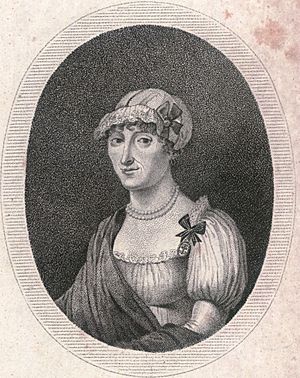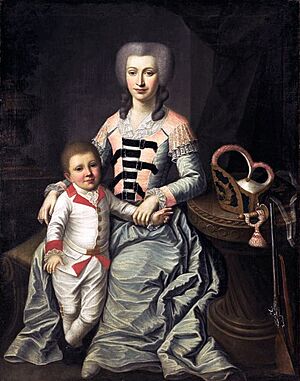Tekla Teresa Łubieńska facts for kids
Quick facts for kids
Tekla Teresa Łubieńska
|
|
|---|---|

Łubieńska, c. 1800
|
|
| Born | Tekla Teresa Bielińska 6 June 1767 Warsaw Poland |
| Died | 15 August 1810 (aged 43) Kraków, Congress Poland, |
| Occupation | Writer, dramatist, translator |
| Genre | Fiction, dramatic fiction, Lyrical poetry, translations of Jean Racine and Voltaire |
| Notable works | 'Charlemagne and Wedekind' |
| Spouse | Count Feliks Walezejusz Łubieński |
| Children | Franciszek, Tomasz Lubienski, Henryk, Tadeusz, Julian, Jan, Józef, Maria, Paulina, Rozalia |
Tekla Teresa Łubieńska (born June 6, 1767, in Warsaw; died August 15, 1810, in Kraków) was a talented Polish writer, poet, and translator. She wrote plays and poems, and she also translated books from other languages into Polish.
Her Life Story
Tekla Teresa Łubieńska was born into a noble Polish family. Her father, Franciszek Bieliński, was a writer and an important government official. Her mother was Krystyna Justyna Sanguszko. Tekla was taught at home, which was common for noble children back then.
When she was 11, her mother passed away. After that, her grandmother, Duchess Barbara Sanguszko, took care of her and made sure she received a good French education.
Later, Tekla married Feliks Łubieński. He became a very important person in the government, serving as the Minister of Justice in a part of Poland called Congress Poland. Tekla and Feliks had ten children together, including two famous sons, Tomasz and Henryk.
During a time of political trouble in Poland, Tekla, who was pregnant, moved with her children to Prague to stay safe. When she returned to Poland in 1785, she settled at her family's estate in Guzów. There, she focused on raising her large family and on her writing. She passed away suddenly in Kraków in August 1810, when she was only 43 years old. Interestingly, she is an ancestor of the British actor, Rula Lenska.
Her Writings
Tekla Teresa Łubieńska was a busy writer. During a period known as the Four-Year Sejm (a time when Poland's parliament was making important changes), she wrote poems that showed her love for her country.
She started by writing comedies, which are plays meant to be funny. She even wrote special plays for children. Later, she wrote historical dramas, which are plays based on real events from the past. Some of her well-known historical plays include:
- Wanda, queen of Poland (written in 1806)
- Charlemagne and Wedekind (written in 1807), which was a two-act play written in verse (like a long poem).
Tekla also translated works by famous French writers like Jean Racine and Voltaire. This means she took their books and plays, which were written in French, and changed them into Polish so more people in Poland could read them.
Important Works
Here are some of Tekla Teresa Łubieńska's most important works:
- Wanda. A tragedy in 5 Acts: This play was published in 1806 and was performed on stage in Warsaw in 1807.
- Charlemagne and Wedekind: This historical play was even set to music by a composer named J. Elsner. It was first performed in the National Theatre in Warsaw in 1807.
Translations
Tekla translated several works from other languages, even though some of her translations were never officially published. These include:
- Elfreda. A tragedy in the mode of Greek dramas, translated from English.
- Siroe by P. A. Metastasio.
- Andromaque by J. Racine.
- The example of a husband and father, a comedy translated from French.
- Candide by Voltaire.
She also wrote letters, including one to her son, Tomasz, in 1806.
See also
 In Spanish: Tekla Teresa Łubieńska para niños
In Spanish: Tekla Teresa Łubieńska para niños
 | Valerie Thomas |
 | Frederick McKinley Jones |
 | George Edward Alcorn Jr. |
 | Thomas Mensah |


